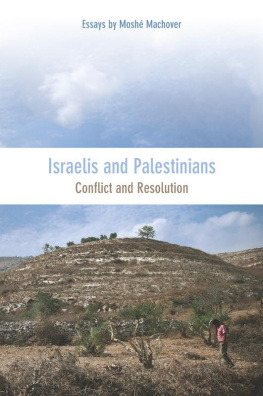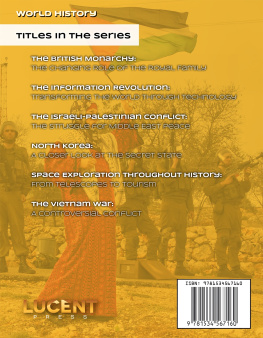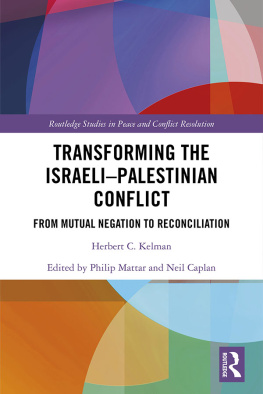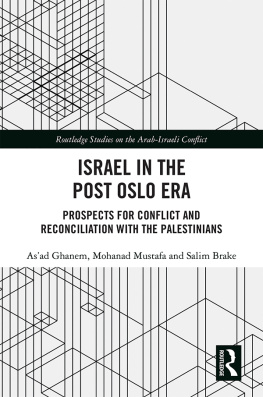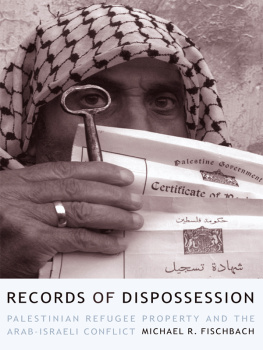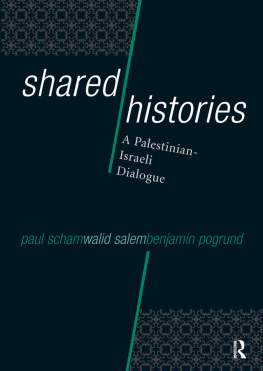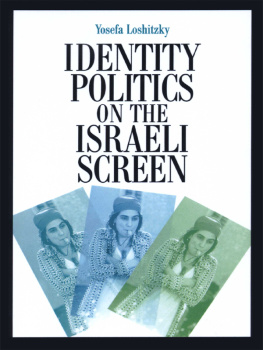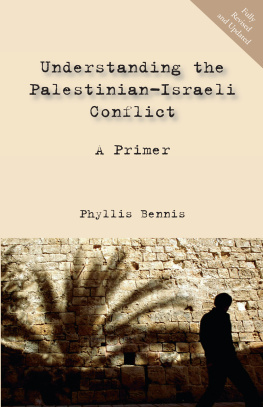Moshé Machover - Israelis and Palestinians: Conflict and Resolution
Here you can read online Moshé Machover - Israelis and Palestinians: Conflict and Resolution full text of the book (entire story) in english for free. Download pdf and epub, get meaning, cover and reviews about this ebook. year: 2012, publisher: Haymarket Books, genre: Politics. Description of the work, (preface) as well as reviews are available. Best literature library LitArk.com created for fans of good reading and offers a wide selection of genres:
Romance novel
Science fiction
Adventure
Detective
Science
History
Home and family
Prose
Art
Politics
Computer
Non-fiction
Religion
Business
Children
Humor
Choose a favorite category and find really read worthwhile books. Enjoy immersion in the world of imagination, feel the emotions of the characters or learn something new for yourself, make an fascinating discovery.
- Book:Israelis and Palestinians: Conflict and Resolution
- Author:
- Publisher:Haymarket Books
- Genre:
- Year:2012
- Rating:3 / 5
- Favourites:Add to favourites
- Your mark:
- 60
- 1
- 2
- 3
- 4
- 5
Israelis and Palestinians: Conflict and Resolution: summary, description and annotation
We offer to read an annotation, description, summary or preface (depends on what the author of the book "Israelis and Palestinians: Conflict and Resolution" wrote himself). If you haven't found the necessary information about the book — write in the comments, we will try to find it.
Israelis and Palestinians: Conflict and Resolution — read online for free the complete book (whole text) full work
Below is the text of the book, divided by pages. System saving the place of the last page read, allows you to conveniently read the book "Israelis and Palestinians: Conflict and Resolution" online for free, without having to search again every time where you left off. Put a bookmark, and you can go to the page where you finished reading at any time.
Font size:
Interval:
Bookmark:

| CONTENTS | |
| ix | |
| Why I Am Not an Israeli Peace Activist (October 2010) | |
| Part I | THE PALESTINIAN STRUGGLE AND THE ARAB EAST; JABRA NICOLA AND HIS HERITAGE |
| Comrade Jabra Nicola (191274) (March 1975) | |
| The Palestine Problem and the Israeli-Arab Conflict (May 18, 1967) | |
| Palestinian Struggle and Middle East Revolution (June 1969) | |
| Arab Revolution and National Problems in the Arab East (Summer 1973) | |
| The National Movement in the Arab East at the End of the Road (August 1976) | |
| Following the Israeli-Egyptian Treaty: Against the Autonomy! (March 1979) | |
| The Middle EastStill at the Crossroads: A Socialist Position on the Palestinian Problem (September 1988) | |
| Sharons Agenda and Arafats Irrelevance (March 2002) | |
| A FAQ: What Do You Think about Suicide Bombers? (March 2005) | |
| Part II | ISRAELI SOCIETY |
| Matzpen and Haolam HazehNew Force (December 1966) | |
| The Social Identity of Haolam Hazeh (January 1967) | |
| The Class Nature of Israeli Society (197071) | |
| Zionism and Oriental Jews: A Dialectic of Exploitation and Co-optation (2008) | |
| Part III | RACISM AND THE NATIONAL QUESTION |
| The Case for Hebrew Self-Determination (1969) | |
| Zionism, National Oppression, and Racism (1976) | |
| Summing Up Our Position on the National Question (January 1978) | |
| Part IV | POLEMICS AGAINST ZIONISM |
| New Premises for a False Conclusion (May 1967) | |
| Resurrection of the Dead (October 1967) | |
| Liars (August 1969) | |
| The Zionist Left and the Palestinian Resistance (late 1969) | |
| Borochovist Revival (March 1971) | |
| Reply to Sol Stern (January 1973) | |
| Zionism and Its Scarecrows (1975) | |
| Abominable Warmongering on the Left (August 2008) | |
| Zionism: Propaganda and Reality (September 2008) | |
| Part V | REVIEWS |
| Things Bad Begun... (1987) | |
| Exploded Myths (1989) | |
| Lost in Translation (1990) | |
| Misinformation as News (2005) | |
| A Peace Activist on the Border (2007) | |
| Zionist Myths Debunked (201011) | |
| Part VI | FINAL ANALYSIS |
| Israelis and Palestinians: Conflict and Resolution (November 2006) | |
| Resolution of the Israeli-Palestinian Conflict: A Socialist Viewpoint (February 2009) | |
| Israeli Socialism and Anti-Zionism: Historical Tasks and Balance Sheet (February 2010) | |
Preface
I n April 2010 I was approached by a well-known British left-wing publisher with a proposal to publish my political autobiography. This flattering offer put me in a quandary.I am a carrier of what I consider to be a valuable corpus of socialist theory and political positions on Zionism and the Israeli-Palestinian conflict, elaborated by the group that I helped to found, the Socialist Organization in Israel, better known by the name of its journal, Matzpen . I felt duty bound to seize the opportunity of presenting these ideas to a wider public, particularly to a new generation of socialists. But would an autobiography be the right vehicle for transmitting the message I was keen to broadcast?By definition, an autobiography is centered around the person of the writer. If I were to write such a narrative, my life story would have to be its main theme, into which the political substance that I wish to convey would have to be slotted as a series of add-on digressions. I suppose this could be contrived somehow, but it would be unsatisfactory. My life (so far) has been interesting, in the sense that I have done things in which I had passionate interest. But my life story has been less than dramatic: no cliff-hangers, no great escapes, no thrilling adventures, and I am happily married to the same woman I wed in my twentieth year. I lack the talent of a fiction writer needed to embellish this taleas some of the autobiographers whose creations I have read (and one or two I have reviewed) did to great effect. As for the political substance: it would have to be presented in a cursory manner, inadequate to its complexity.My dilemma was happily resolved when, about four months later, I was contacted by Haymarket Books with an offer to publish a collection of my essays and articles on the Israeli-Palestinian conflict. This book is the outcome.As I have said, the ideas, theoretical analyses, and political statements presented here are collective products of a remarkable group, Matzpen, the importance of whose heritage is disproportionate to its small size. I am not trying to hide my light under a bushel: I believe I played a significant part in producing, elaborating, and formulating these ideas, and especially in arguing publicly for them. But that is what it was: a part in a group dialectic, inconceivable without this collective matrix.Matzpen was formed in 1962. The impetus for this had little to do with the Israeli-Palestinian conflict; rather, it was a resolve to break away from the Stalinist tradition and launch an independent radical socialist organization. In this respect we were, without first realizing it, part of a 1960s-era world movement of socialist regeneration. In the early years, our main activity was propaganda for promoting workers rights by the creation of genuine trade unions, outside the corporatist-bureaucratic stranglehold of the Histadrut.Of course, being consistent socialists, we were anti-Zionists. But it took us some time to elaborate an independent detailed analysis of Zionism and the Israeli-Arab conflict. Fortunately, we had breathing space to do so. The early formative years of Matzpen happened to fall within a period in which the Israeli-Arab conflict was at its most quiescent: between the immediate aftermath of the 1956 Suez war and the June war of 1967. So we were able to deliberate over these issues rather than being forced to react off the cuff to a fast-moving reality under the pressure of current events.By the time the catastrophic 1967 war broke out, we were equipped with conceptual weapons for confronting it and its consequences. Our analysis can be summarized in the following four points:1. Zionism is a colonizing project, and Israel, its embodiment, is a settler state. The core of the Israeli-Arab conflict is the clash between Zionist colonization and the indigenous people, the Palestinian Arabs.This did not require great perspicacity; it was a straightforward observation of evident facts. Nevertheless, it is remarkable how few people in the West see things in these terms even today. In the Israel of the mid-1960s, Matzpen was alone in expressing this view explicitly and clearly. (The Israeli Communist Party avoided using such terms as Zionist colonization, and confined the brunt of its critique of Zionism to the latters alignment with Western imperialism against the Soviet Union.)2. We pointed out that Zionist colonization belongs to a different species from, for example, that of South Africa and Algeria: rather than being based on exploiting the labor power of the indigenous people, it sought to exclude and eliminate them.This observationwhich has profound implications regarding the nature of the conflict and its eventual resolutioncame quite naturally to us, as Marxists. It was of course obvious to the Palestinian victims of Zionist colonization, and was noted also by many of their Arab and third-world supporters. But it eludes many thinkers and activists whose attitude to colonialism is purely moral: for example, those who regard it as a consequence or manifestation of racism rather than the other way around. For many years we were virtually alone in Israel and the West in stressing the fundamental significance of this feature of Zionist colonization. In recent years it has been picked up by some academic critics of Zionism, but most of them have failed to recognize or admit that we had long anticipated them.3. We insisted on the regional context of the Israeli-Palestinian conflict. Due to the specific features of Zionist colonization, the balance of power is heavily tilted in favor of Israel (backed by its imperialist sponsor) and against the Palestinian people. The imbalance could only be redressed, and Palestinian liberation would become possible, as part of a revolutionary transformation of the region, by an Arab revolution led by the working class, which would overthrow the repressive regimes, unify the Arab East, and put an end to imperialist domination over it.We were not alone in holding this view: it was shared by leftists in the Palestinian resistance movement. However, as reaction strengthened its hold on the Arab world from the 1970s, many people who initially looked forward to an Arab revolution lost hope and sought shortcutswhich, predictably, proved to be illusoryto resolving the Palestinian problem. We remained rather isolated in clinging to the revolutionary regional perspective.But very recently, while I was putting together the present book, the eruption of a revolutionary tempest in the Arab world has lent much greater credibility to our regional perspective. I shall return to this point below.4. Our regional view of the Israeli-Palestinian conflict applied not only to the process whereby it would be resolved but extended also to the form of the resolution itself. Unlike almost all who addressed the issue, we did not believe that a resolution would occur within the confines of Palestine (established by the British imperialists and their French allies following the First World War). Thus, we did not advocate a so-called two-state solution in a repartitioned Palestine, nor a one-state solution in a unitary Palestine. Instead, we envisaged incorporation of the two national groupsthe Palestinian Arabs and the Hebrews (so-called Israeli Jews)as units with equal rights within a socialist regional union or federation of the Arab East.This book contains a selection of essays, articles, statements, and short pieces written by me, or cowritten with my comrades, over some four and a half decades, between 1966 and 2010. Inevitably, during this long and eventful period, the original ideas and insights outlined above have evolved and been modified in response to changing reality, as well as in the light of further reflection. The items are presented here as they were published originally, except for minor stylistic editing. They represent my opinions at the time of writing; and I would certainly put some things differently today, with the benefit of hindsight as well as second thoughts. Some polemical pieces may perhaps seem too acerbic after the passage of time.Nevertheless, I believe that the reader will find a fair degree of overall consistency and continuity. Indeed, I must apologize for the fact that some items, written at very different times, overlap in content and argumentation. This is unavoidable and even deliberate: each item included in this collection, even if it repeats some ideas presented in earlier items, also contains some new arguments or analyses that would make little sense if presented on their own, in isolation from their context.The opening item is a brief personal statement, in which I distance myself from the widespread beliefheld even by many whom I regard as political allies, if not as close comradesthat the Israeli-Palestinian conflict can be addressed primarily in terms of war and peace: war is what we have now, and peace, to be achieved by a genuine peace process, is what we need to have. This apparently innocent belief serves as ideological camouflage: it presents in symmetric terms a conflict that is profoundly asymmetric. It disguises the reality of the issue: a confrontation between past and ongoing Zionist colonization and the Israeli settler state on one side, and the indigenous Palestinian Arab people on the other.Insistence on the colonial nature of the conflict, and elaboration of its specific features, is a leitmotif that runs through the entire book.The remaining articles are grouped into parts by theme. Part I consists of fairly brief items expressing the Matzpen position on the Palestinian struggle, viewed in a regional context. They are arranged chronologically except for the first item: my obituary of Jabra Nicola, which is put first in acknowledgment of his important influence on what follows. The oldest item in this part dates from shortly before the 1967 war and the last substantive item was written in 1988; so the reader can assess both the continuity and the evolution in Matzpens views over those two decades.The items within each of the following parts are in chronological order. Part II is concerned with Hebrew (Israeli-Jewish) society. A specific feature of the type of colonization based on excluding and displacing the indigenous people (rather than exploiting their labor power) is the formation of a new settler nation. Zionist colonization is no exception to this rule. However, it has a unique feature: Zionist ideology denies the fact that a new Hebrew nation has come into existence because its self-legitimation depends on the fiction that all Jews around the world are one nation that has an eternal national right over its ancient god-promised and god-given homeland, Eretz Yisrael . Uri Avnery, a journalist who published and edited a popular journal, Haolam Hazeh (This World), was strongly influenced by a group of intellectuals who called themselves the Young Hebrews (also known as Canaanites, a term of mild abuse conferred on them by their Zionist critics). Founded in 1939, they denied the Zionist myth of a worldwide Jewish nation, advocated recognition of the reality of a new Hebrew nation, and preached a new Hebrew nationalism of a decidedly right-wing tinge. Avnery adopted their Hebrew nationalismwhich of course challenged Zionism on a crucial ideological tenetbut discarded the extreme right-wing elements of their outlook. Whereas the Young Hebrews looked forward to Hebrew domination of the entire region (whose inhabitants were to be assimilated into this new nation, as they were allegedly devoid of any national identity of their own), Avnery and his co-thinkers looked forward to integration of Israel in the Arab East. Avnery also actively promoted equality of rights for Israels Arab citizens. In 1965, he founded a new movement, and ran for the Knesset, Israels parliament. Members of Matzpen participated as individuals in this movement, because we approved of its rejection, however partial, of Zionism, its regional outlook, and its support of equal rights.The first two items in part II are concerned with that episode of cooperation. They make it clear why it was inevitably short-lived. The third item, dating from 1970 to 71, is a general analysis of Israeli society. It is perhaps the best known of all essays originating from Matzpen: it has been reprinted and circulated widely in several versions. Although outdated in several fundamental respects, it seems to me of sufficient historical interest to be reproduced here.One of the facts pointed out in this analysis is the large overlap between the Hebrew working class and the Israeli Mizrahim (immigrants from mostly Muslim Asian and African countries). This aspect of Israeli society is taken up in the last item of part II. Written more than thirty-eight years later, it revisits the position of the Mizrahim in Israel and argues against the identity ideology that addresses this issue primarily as a manifestation of Zionisms Orientalist attitude.Part III addresses the complex issues of racism and the national question in the specific context of the Israeli settler state. As a rule, colonization projects practice racism against the indigenous people and use racist ideology for self-legitimation. At the same time, the national identity of the latter is also suppressed. Zionist colonization is no exception to this rule. The second item in part III attempts to clarify the analytic difference between these two types of oppression and the way they are combined in the concrete reality of Israel.Another aspect of the national problem arises from the crucial specific feature of Zionist colonization pointed out in point 2 above. As a rule, where the indigenous people were excluded and displaced, rather than being used as the main source of exploitable labor power, the settlers emerged as a new nation. Israel is again no exception (although, as mentioned above, Zionist ideology denies the fact that a new Hebrew nation has come into existence). The first and third items in part III argue that resolution of the Israeli-Palestinian conflict would be impossible without recognizing this fact. Following the overthrow of Zionism, the Hebrew nation must be accorded due national rights within a regional union.Part IV is entitled Polemics against Zionism . The brand of Zionism addressed is for the most part what is commonly known as socialist or left-wing Zionism. Except for four early items, the bulk of the material in this part, including two fairly long essays, were originally written for publication outside Israel. The reason for this is that, while left-wing Zionism was rapidly losing ground in Israeli politics, its ideology was still being used by the Zionist propaganda machine abroad. It had some appeal among leftists in Europe and the United States, and we saw it as our duty to confront that propaganda and enlighten the international left as to the true nature of the Zionist project and Israel. Today most of the radical left around the world is much more critical of Israeli policies and of Zionist ideology than it used to be. But battles against regressive ideologies are rarely won once and for all; they have to be refought again and again. So the material in this part can be of more than archival interest.Part V contains book reviews written at various times since 1987. Each of them is included for a specific reason, to make some particular point. Thus, for example, the review of the book by Zeev Schiff and Ehud Yaari exposes the changes made in the English translation from the original Hebrew, to suit the convenience of Zionist propaganda abroad. The review of the book by Greg Philo and Mike Berry will, I hope, make this invaluable report of media research more widely known and read. My review of Michel Warschawskis book serves to set the record straight on the history of Matzpen and other factual and political issues.Part VI is entitled Final Analysis, not because it has any claim to real finalityno such thing is possiblebut simply because it sums up much of the foregoing. It contains my most recent elaboration of points 14 outlined above. Unlike the items in earlier parts, the three items here were planned as a sequence: the second item was intended to be read as a sequel to the first, and the third item was meant to round off the analysis.When I started putting together the material for this collection, on the one hand I felt like a Cassandra: my comrades and I were pretty accurate in foretelling the moves made by the forces of oppression, we expected the worst from their side, and we warned against trusting in illusory peace processes manipulated by them. But few people believed our predictions. On the other hand, I was disappointed by what appeared to be the failure of the forces of our side, those of progressive transformation and regional revolution, to manifest themselves as we had expected and predicted. While never losing faith in the ultimate victory of the forces of progress, and eventually of socialism, I felt that this was a vision for the very long term.This somewhat wistful mood changed while I was still busy gathering the material for this book, with the eruption of the Arab revolution, which seemed to presage the developments that our theoretical analysis had pointed toward.Of course, it would be very nave to expect the present upheaval to lead to a decisive victory of the revolution in the near future. Setbacks and counterrevolutionary reactions are most likely. But a victorious Arab revolution is no longer an abstract projection: the events of the Arab Awakening of 2011 make it a tangible potentiality. And these events also demonstrate the necessary connection between the revolutionary liberation of the masses of the region and the decline and eventual demise of imperialist hegemony over it. For material in English relating to Matzpen, see its website at http://matzpen.org/index.asp?p=100. A short history is at http://matzpen.org/index.asp?p=140.Next pageFont size:
Interval:
Bookmark:
Similar books «Israelis and Palestinians: Conflict and Resolution»
Look at similar books to Israelis and Palestinians: Conflict and Resolution. We have selected literature similar in name and meaning in the hope of providing readers with more options to find new, interesting, not yet read works.
Discussion, reviews of the book Israelis and Palestinians: Conflict and Resolution and just readers' own opinions. Leave your comments, write what you think about the work, its meaning or the main characters. Specify what exactly you liked and what you didn't like, and why you think so.

